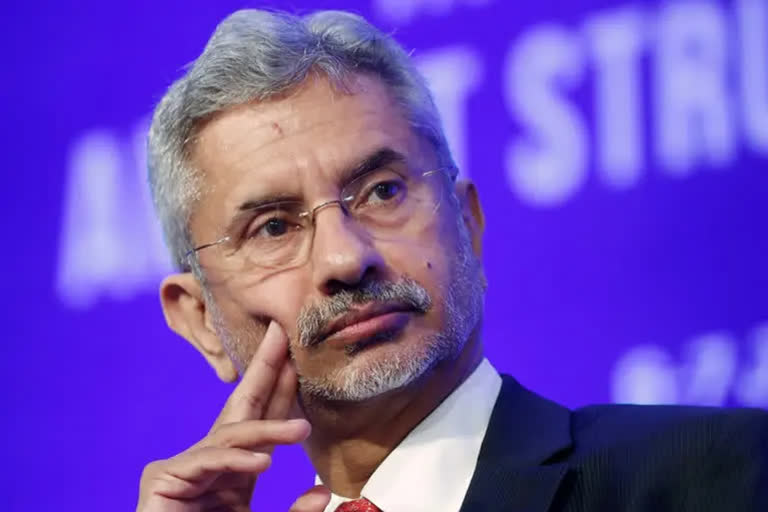New Delhi: External Affairs Minister Dr S Jaishankar on Thursday said India believes that greater connectivity is an economic force-multiplier that has acquired greater salience in the post-Covid era.
Speaking at the 20th meeting of the SCO Council of Heads of Government held under the chairmanship of Kazakhstan, Jaishankar said, "India believes that greater connectivity is an economic force-multiplier which has acquired greater salience in the post-Covid era. However, any serious connectivity initiative must be consultative, transparent and participatory. It must conform to the most basic principle of international law – respect for sovereignty and territorial integrity".
He said that India has been taking steps to operationalize the Chabahar port in Iran to provide secure and commercially viable access to the sea for Central Asian countries.
"We have also proposed to include the Chabahar port in the framework of International North-South Transport Corridor (INSTC). I would like to reaffirm India’s commitment to cooperate, plan, invest and build physical and digital connectivity in the SCO region", Jaishankar added.
He noted that India today is an emerging economic force at the global level. Despite the economic devastation caused by COVID-19, India’s agile response in fighting the pandemic and ensuring economic stability has been noteworthy.
"The International Monetary Fund (IMF) has forecast a 9.5% growth in the Indian economy in 2021. Our trade performance has also been strong, growing by more than 20% this year. Despite COVID, India attracted record FDI inflows of $77 billion in 2020-21 and another $22 billion in the first three months of this year", EAM Jaishankar said.
Read: India-China going through 'bad patch' due to Beijing's actions, violation of agreements: Jaishankar
WIPO has ranked India number one in the Global Innovation Index 2021 in the Central and South Asian region. Indian Startups have so far created 65 unicorns, out of which 28 unicorns were added during 2021 alone. We stand ready to share our experience with the other SCO Member States through our initiative to set up a Special Working Group on Startups and Innovation.
He underlined that today the world acknowledges that India is among the few large economies that have delivered in letter and spirit on the Paris Agreement.
"A developing country like India that is working to lift millions out of poverty, has not spared any effort to fulfil its global environment obligations. In parallel, we have surged ahead in developing renewables and today India ranks 4th in the world in installed renewable energy capacity", he reiterated.
India's non-fossil fuel energy has increased by more than 25% in the last 7 years and now it has reached 40% of our energy mix. Along with this, India has also given institutional solutions to cooperate with the world at the international level. As a revolutionary step in solar power, we co-initiated the International Solar Alliance that now has more than 100 Member States.
He also highlighted that India has also created the Coalition for Disaster Resilient Infrastructure for climate adaptation.
He further recalled Prime Minister Modi's recent call for One Sun: One World: One Grid and Green-Grid Initiatives which are expected to lead to the development of a cohesive and robust global grid.
India is ready to share its experience in climate change mitigation and adaptation in the SCO format.
"The socio-political impact of COVID-19 is far from over and has exposed the weakness of global institutions. This is the time to bring in much-needed reforms to our global institutions, including the WHO, and rework our development strategies to face a post-COVID-19 world", he added.
Jaishankar said that there is a need for a Reformed and Reinvigorated Multilateralism that reflects today's realities, which gives voice to all stakeholders, addresses contemporary challenges and puts human beings at the centre of our thought and policies.
India considers the SCO as an important regional group to promote cooperation in various fields based on universally recognized international norms, good governance, Rule of law, openness, transparency and equality.
It is unfortunate to note that there have been repeated attempts to deliberately bring bilateral issues into SCO. This violates the well-established principles and norms of the SCO Charter. Such acts are counterproductive to the spirit of consensus and cooperation that define this organization and should be condemned.
This meeting takes place as SCO celebrates its 20th anniversary in a rapidly changing global and regional environment. In these times of unprecedented upheaval, it is heartening to note that SCO continues to play a significant role in promoting peace and stability in the region. India remains committed to contributing constructively to the implementation of the mandate of SCO, Jaishankar stated during his remarks.
He also pointed out that the recent meeting of COP 26 in Glasgow has sharpened the realization that for many developing countries, climate change remains the biggest existential threat.
Fighting climate change calls for resources, innovation, cooperation and lifestyle modifications to make the changes that the world needs.
"As we move towards practical implementation of the trade and economic agenda of SCO, we must simultaneously, pay heed to the climate change impact of our joint activities", he added.
Read: SCO meet: India-Uzbekistan agree to coordinate on regional concerns



